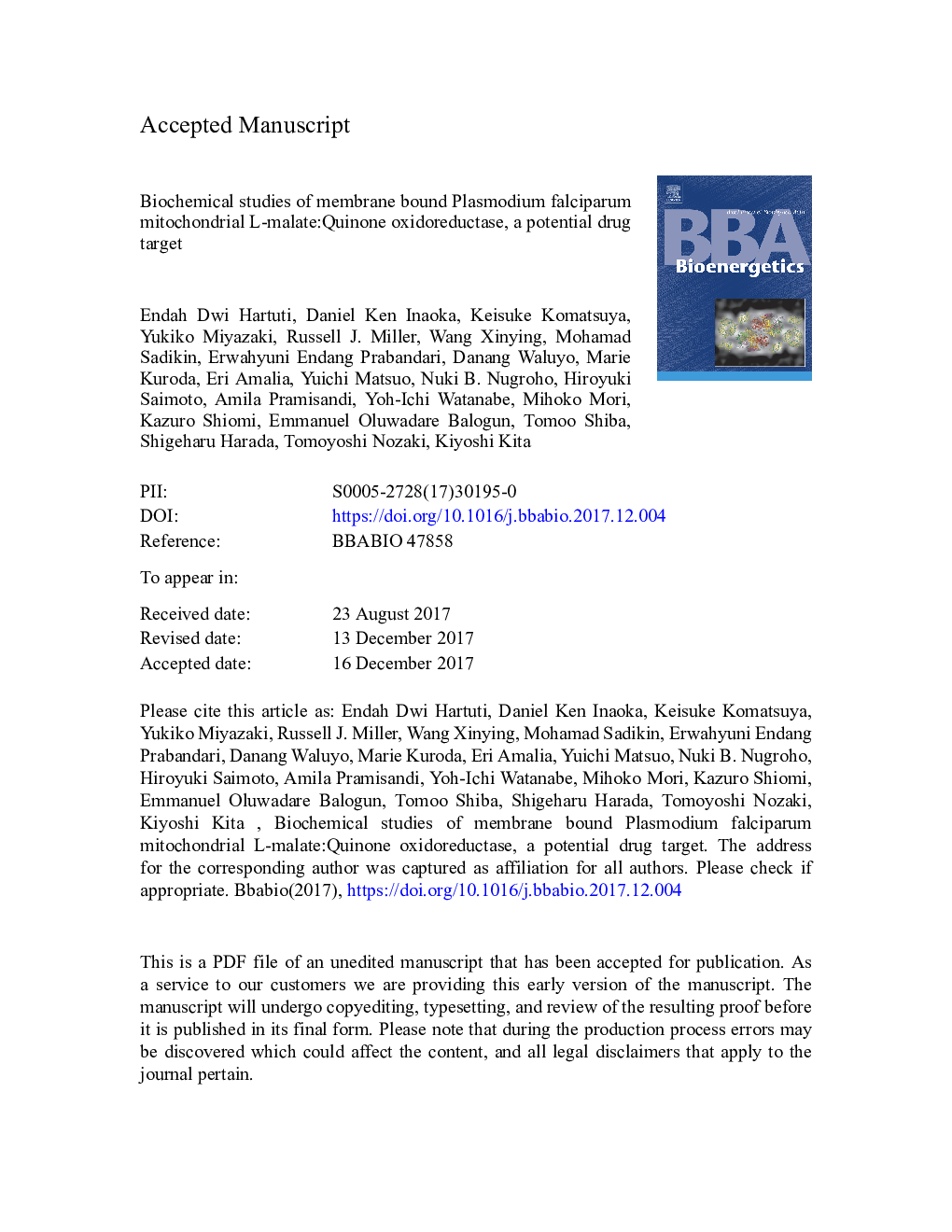| کد مقاله | کد نشریه | سال انتشار | مقاله انگلیسی | نسخه تمام متن |
|---|---|---|---|---|
| 8298641 | 1537036 | 2018 | 36 صفحه PDF | دانلود رایگان |
عنوان انگلیسی مقاله ISI
Biochemical studies of membrane bound Plasmodium falciparum mitochondrial L-malate:quinone oxidoreductase, a potential drug target
دانلود مقاله + سفارش ترجمه
دانلود مقاله ISI انگلیسی
رایگان برای ایرانیان
کلمات کلیدی
موضوعات مرتبط
علوم زیستی و بیوفناوری
علوم کشاورزی و بیولوژیک
دانش گیاه شناسی
پیش نمایش صفحه اول مقاله

چکیده انگلیسی
Plasmodium falciparum is an apicomplexan parasite that causes the most severe malaria in humans. Due to a lack of effective vaccines and emerging of drug resistance parasites, development of drugs with novel mechanisms of action and few side effects are imperative. To this end, ideal drug targets are those essential to parasite viability as well as absent in their mammalian hosts. The mitochondrial electron transport chain (ETC) of P. falciparum is one source of such potential targets because enzymes, such as L-malate:quinone oxidoreductase (PfMQO), in this pathway are absent humans. PfMQO catalyzes the oxidation of L-malate to oxaloacetate and the simultaneous reduction of ubiquinone to ubiquinol. It is a membrane protein, involved in three pathways (ETC, the tricarboxylic acid cycle and the fumarate cycle) and has been shown to be essential for parasite survival, at least, in the intra-erythrocytic asexual stage. These findings indicate that PfMQO would be a valuable drug target for development of antimalarial with novel mechanism of action. Up to this point in time, difficulty in producing active recombinant mitochondrial MQO has hampered biochemical characterization and targeted drug discovery with MQO. Here we report for the first time recombinant PfMQO overexpressed in bacterial membrane and the first biochemical study. Furthermore, about 113 compounds, consisting of ubiquinone binding site inhibitors and antiparasitic agents, were screened resulting in the discovery of ferulenol as a potent PfMQO inhibitor. Finally, ferulenol was shown to inhibit parasite growth and showed strong synergism in combination with atovaquone, a well-described anti-malarial and bc1 complex inhibitor.
ناشر
Database: Elsevier - ScienceDirect (ساینس دایرکت)
Journal: Biochimica et Biophysica Acta (BBA) - Bioenergetics - Volume 1859, Issue 3, March 2018, Pages 191-200
Journal: Biochimica et Biophysica Acta (BBA) - Bioenergetics - Volume 1859, Issue 3, March 2018, Pages 191-200
نویسندگان
Endah Dwi Hartuti, Daniel Ken Inaoka, Keisuke Komatsuya, Yukiko Miyazaki, Russell J. Miller, Wang Xinying, Mohamad Sadikin, Erwahyuni Endang Prabandari, Danang Waluyo, Marie Kuroda, Eri Amalia, Yuichi Matsuo, Nuki B. Nugroho, Hiroyuki Saimoto,